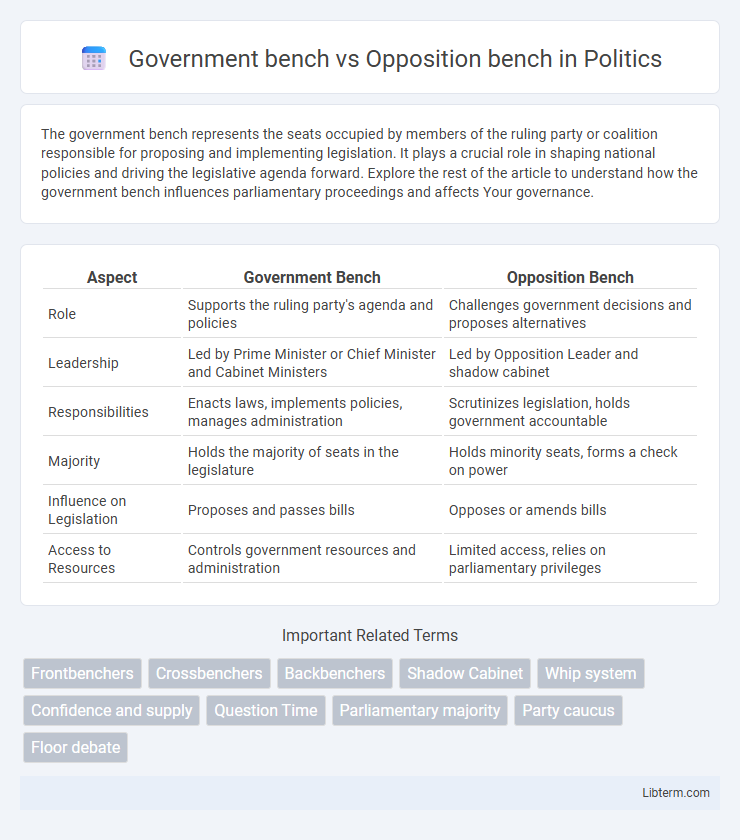The government bench represents the seats occupied by members of the ruling party or coalition responsible for proposing and implementing legislation. It plays a crucial role in shaping national policies and driving the legislative agenda forward. Explore the rest of the article to understand how the government bench influences parliamentary proceedings and affects Your governance.
Table of Comparison
| Aspect | Government Bench | Opposition Bench |
|---|---|---|
| Role | Supports the ruling party's agenda and policies | Challenges government decisions and proposes alternatives |
| Leadership | Led by Prime Minister or Chief Minister and Cabinet Ministers | Led by Opposition Leader and shadow cabinet |
| Responsibilities | Enacts laws, implements policies, manages administration | Scrutinizes legislation, holds government accountable |
| Majority | Holds the majority of seats in the legislature | Holds minority seats, forms a check on power |
| Influence on Legislation | Proposes and passes bills | Opposes or amends bills |
| Access to Resources | Controls government resources and administration | Limited access, relies on parliamentary privileges |
Introduction to Government and Opposition Benches
The Government bench consists of members who support the ruling party or coalition, responsible for proposing and defending legislation. The Opposition bench includes members from parties not in power, tasked with scrutinizing government actions and holding them accountable. This division ensures a balanced parliamentary debate and effective democratic governance.
Definition and Roles of the Government Bench
The Government bench consists of members of the ruling party or coalition responsible for proposing and supporting legislation that aligns with the executive branch's policies. It plays a crucial role in initiating bills, defending government actions, and ensuring the passage of laws through effective debate and voting. The Government bench also collaborates closely with ministries to implement the government's agenda within the legislative framework.
Responsibilities and Functions of the Opposition Bench
The Opposition bench plays a critical role in any parliamentary democracy by holding the government accountable through rigorous scrutiny of policies, debates, and legislation. It ensures transparency and checks the misuse of power by questioning government actions, proposing alternatives, and representing diverse public opinions. The Opposition functions as a vital counterbalance to the ruling party, fostering democratic governance and safeguarding minority interests.
Structural Differences in Parliamentary Seating
The Government bench is occupied by members of the ruling party or coalition, positioned to the Speaker's right in most parliaments, reflecting their role in actively supporting and proposing legislation. The Opposition bench faces the Government, typically to the Speaker's left, housing members who scrutinize and challenge government policies, ensuring accountability. Structural differences include the spatial arrangement that symbolizes the political dichotomy, with seating designed to facilitate debate and visible alignment of party affiliations.
Key Powers Held by Each Bench
The Government bench holds the power to introduce and pass legislation, control the executive branch, and implement policies through majority support in the legislature. The Opposition bench plays a critical role in scrutinizing government actions, questioning executive decisions, and proposing alternative policies or amendments. Both benches are essential for maintaining democratic checks and balances within parliamentary proceedings.
Interactions Between Government and Opposition Benches
Government and Opposition benches engage dynamically during parliamentary sessions, with government members presenting legislation and opposition members scrutinizing, questioning, and debating policies to ensure accountability. The interactions are marked by strategic dialogue, where opposition benches challenge government proposals, prompting clarifications or amendments that refine legislative outcomes. These exchanges are crucial for democratic processes, fostering transparency and balancing power within the legislative framework.
Impact on Legislative Processes
The Government bench, supported by the ruling party or coalition, plays a crucial role in driving the legislative agenda by proposing bills and mobilizing votes for their passage. The Opposition bench scrutinizes government proposals, offers alternative policies, and holds the ruling side accountable, which promotes transparency and debate within parliamentary proceedings. The dynamic between these benches impacts the efficiency, quality, and balance of lawmaking, influencing the overall effectiveness of democratic governance.
Challenges Faced by Both Benches
The Government bench often faces challenges such as maintaining party unity, managing legislative agendas, and addressing public criticism during policy implementation. The Opposition bench struggles with limited access to information, reduced speaking time, and difficulties in mobilizing public support to effectively hold the government accountable. Both benches experience pressure to balance rigorous debate with constructive policymaking amid intense political rivalry.
Influence on Public Policy and Decision-Making
The Government bench holds primary authority in shaping public policy and decision-making due to its legislative majority and control over the executive branch, enabling the proposal and implementation of laws and programs aligned with its agenda. The Opposition bench plays a critical role by scrutinizing government actions, offering alternative policies, and holding the ruling party accountable through debates, questions, and committee participation. Their influence ensures democratic checks and balances, fostering transparency and encouraging public discourse on policy effectiveness.
Conclusion: Balancing Power in Parliamentary Systems
The Government bench holds the majority support necessary to enact policies and drive legislative agendas, while the Opposition bench provides critical oversight and accountability, ensuring diverse perspectives influence governance. Effective parliamentary systems balance power by fostering constructive dialogue and maintaining checks and balances between these benches. This equilibrium is essential for democratic stability, preventing autocratic dominance and promoting transparent, responsive policymaking.
Government bench Infographic

 libterm.com
libterm.com